Doors are critical to home security, standing as the first line of defense against unauthorized access. High-quality materials like steel, wood, and fiberglass offer robust barriers. Reinforcing door frames, installing deadbolts, and leveraging smart lock technology greatly enhance security. In my experience, a solid door frame and high-quality lock can thwart potential intrusions. Regular maintenance, including lubricating hinges and inspecting lock mechanisms, guarantees ongoing effectiveness. Doors not only provide physical security but instill a sense of safety and control. Understanding the intricacies of door security can further elevate your home’s defense.
Introduction

Understanding the pivotal role of doors in home security is essential for safeguarding your property. Different door types offer varying levels of protection, each with unique security features that can be tailored to your specific needs. Personal experiences often reveal that simple enhancements, such as upgrading locks and adding door security bars, can transform a vulnerable entry point into a robust barrier against unauthorized access.
The Crucial Role of Doors in Home Security
In the domain of home security, doors act as the primary barrier against unauthorized access, making their fortification a critical aspect of safeguarding one’s home. As the most common entry point for intruders, the integrity of your door can make or break your home’s defense. Weak or compromised doors are easily breached, presenting a significant vulnerability. Personal experiences have highlighted the peace of mind that comes from investing in high-quality locks and reinforced door frames. Technical measures, such as security-grade materials and robust locking mechanisms, deter criminals by increasing the effort required for forced entry. Therefore, a well-secured door not only enhances overall home security but also provides homeowners with a reassuring sense of control and safety.
Overview of Door Types and Their Security Features
When evaluating your home’s security, three primary types of doors—steel, solid wood, and impact-resistant fiberglass—stand out for their unique features and benefits. Steel doors offer unmatched durability and strength, making them a formidable barrier against intruders. Solid wood doors, known for their classic aesthetic, also provide robust security due to their density and weight. Impact-resistant fiberglass doors combine high security with energy efficiency, appealing to homeowners looking for a versatile solution. From personal experience, choosing the right door material greatly enhances home security, offering peace of mind. Proper maintenance is equally essential, ensuring these doors perform effectively in safeguarding your home. Selecting the best door type is a pivotal step in fortifying your residence.
Understanding Door Anatomy

Understanding the anatomy of a door is fundamental to enhancing its security, as each component—from the door slab to the deadbolt—plays a critical role. Expertly constructed frames, robust hinges, and high-quality lock mechanisms are essential in preventing unauthorized access. Drawing from years of experience, I’ve seen that selecting the right materials, whether wood, metal, or composite, greatly impacts both durability and security.
Essential Components of a Secure Door
A secure door relies on several critical components, each playing an essential role in fortifying the entryway against potential intrusions. Understanding the door’s anatomy helps identify weak points that burglars may exploit. The door frame, often overlooked, is vital for preventing forced entry, providing the necessary support and stability. High-quality hinges guarantee smooth operation and make it difficult to remove the door. The strike plate, deadbolt, and lockset work in unison to secure the door. In my experience, investing in a solid deadbolt and robust strike plate greatly enhances security. These components collectively deter unauthorized entry attempts, making your home a fortress against intrusions.
Frames, Hinges, and Lock Mechanisms
Building on the foundational concepts of secure door components, it is imperative to thoroughly understand the intricate roles of frames, hinges, and lock mechanisms in reinforcing your home’s first line of defense. Door frames play a vital role in providing structural support and alignment, essential for maintaining the integrity of the door. Hinges, often overlooked, are pivotal; they enable smooth operation and secure attachment to the frame. Lock mechanisms, including deadbolts and latch bolts, are the primary barriers against unauthorized entry, demanding robust construction and regular maintenance. My experience highlights the importance of inspecting these elements meticulously; a slight misalignment in the frame or a loose hinge can create significant vulnerabilities. Regular checks and maintenance are paramount to ensure these components perform at their best.
Materials: Wood, Metal, and Composite
Selecting the appropriate door material—be it wood, metal, or composite—is pivotal for optimizing security, energy efficiency, and aesthetic appeal in your home. Wood doors exude timeless charm but demand regular maintenance to avoid warping and weather damage. My clients often prefer metal doors for entry points due to their superior security and durability; steel, in particular, resists forced entry effectively. Composite doors, such as those made from fiberglass, offer a thorough security assessment alternative that mimics wood’s appearance without its drawbacks. Each material has distinct benefits, and understanding the door’s anatomy, including the frame, panels, hinges, and locks, is crucial for a thorough security assessment. Making an informed choice empowers homeowners to balance functionality and style.
Types of Residential Doors

When considering residential door options, homeowners often prioritize security features and material strength. Solid wood doors offer robust durability, metal doors provide exceptional protection against forced entry, and fiberglass doors strike a balance between strength and aesthetic appeal. Each type of door comes with its unique advantages, making it important to choose the right one for your specific security needs.
Solid Wood Doors: Strength and Durability
Solid wood doors stand out as a premier choice in residential security due to their unparalleled strength and durability. Crafted from dense timber, these doors provide robust resistance against forced entry, making them a formidable barrier. Their natural insulation properties help maintain stable indoor temperatures, reducing energy costs and enhancing comfort. I recall a client who chose a solid wood door for its aesthetic versatility, seamlessly integrating with their home’s traditional architecture. With proper maintenance, these doors can last for decades, ensuring long-term protection. Investing in a solid wood door not only enhances your home’s security but also elevates its curb appeal, striking a balance between safety and style. For homeowners seeking control and reliability, solid wood is unmatched.
Metal Doors: Maximum Protection Against Intrusion
Among the various types of residential doors, metal doors stand out for their unparalleled ability to provide maximum protection against intrusion. Constructed primarily from steel, these doors are highly resistant to forced entry, offering a robust security solution. From a technical perspective, steel doors do not warp, crack, or deteriorate over time, ensuring long-term durability and reliable protection. In my years of securing homes, I’ve found that the investment in a high-quality metal door greatly enhances a home’s security posture. For homeowners who prioritize control and peace of mind, metal doors represent an excellent choice, creating a formidable barrier against potential intruders. This makes them a superior first line of defense in home security.
Fiberglass Doors: Combining Strength and Aesthetic Appeal
While metal doors offer unparalleled security, fiberglass doors present a compelling alternative by combining notable strength with a wide array of aesthetic options. Renowned for their durability, fiberglass doors resist dents, cracks, and warping, ensuring longevity. The availability of wood-grain finishes that mimic real wood provides homeowners a visually appealing choice without the maintenance associated with traditional wooden doors. From a technical standpoint, their superior insulation properties contribute to energy efficiency, helping to maintain a stable indoor climate. In my experience, fiberglass doors require minimal upkeep, making them an excellent investment for those who value both form and function. For homeowners seeking a balanced blend of strength, energy efficiency, and aesthetic appeal, fiberglass doors are a prime choice.
Security Enhancements for Your Door
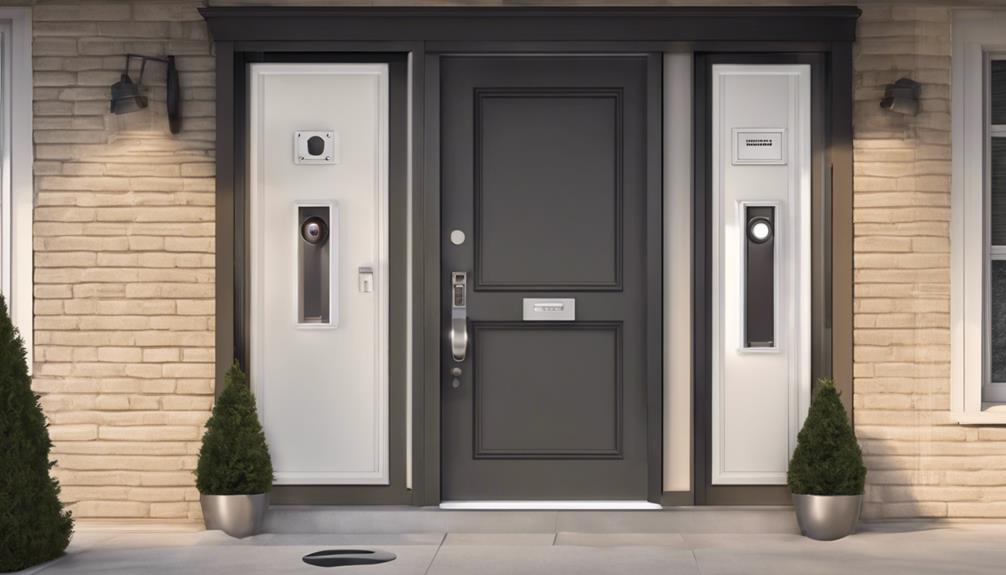
When it comes to fortifying your entry door, several key enhancements can provide substantial security benefits. Installing robust deadbolt locks and employing modern smart lock technology offer both traditional and cutting-edge solutions to keep intruders at bay. Additionally, reinforcing door frames can prevent forced entries, ensuring your home remains a safe haven.
Deadbolt Locks: Essential for Added Security
Deadbolt locks, with their robust steel bolts extending deep into door frames, serve as a critical barrier against unauthorized entry, greatly enhancing the security of residential and commercial properties. From my extensive experience in home security consultation, I can affirm that a high-quality deadbolt lock is indispensable for deterring break-ins. These locks are not only cost-effective but also relatively simple to install, making them an accessible option for most homeowners. A properly installed deadbolt greatly complicates forced entry attempts, as the steel bolt engages deeply with the door frame, creating a formidable obstacle for intruders. This straightforward yet powerful enhancement ensures that your entry points are more secure, thereby granting you greater control over your property’s safety.
Keypad and Smart Locks: Modern Solutions for Tech-Savvy Homeowners
Embracing the latest in home security technology, keypad and smart locks offer unparalleled convenience and enhanced security for today’s tech-savvy homeowners. These keyless entry systems eliminate the need for traditional keys, reducing the risk of lost or duplicated keys. Users can create customizable access codes for family members, guests, and service providers, granting selective entry while maintaining control. Integrating seamlessly with home automation systems, these locks can be monitored and operated remotely via smartphone apps, providing real-time alerts and activity logs. Personal experience highlights the peace of mind achieved by being able to secure or grant access to doors and issue temporary access codes from anywhere. This modern approach to door security is both a practical and sophisticated solution for contemporary living.
Reinforcing Door Frames: Preventing Forced Entries
Enhancing the resilience of your door frames with metal reinforcements is a critical step in preventing forced entries and ensuring strong home security. Incorporating long strike plates with deep screws greatly strengthens the door frame’s strength, rendering it more resistant to kicks and prying. Drawing from personal experience, installing European door bending techniques on hinges has notably improved entryway security in my own home. Additionally, integrating anti-snap and anti-drill locks adds another layer of protection. For those seeking the utmost in security, solid steel doors offer unparalleled durability and resistance to break-ins. These enhancements collectively guarantee that your door remains a formidable barrier against unauthorized access, providing peace of mind and control over your home’s safety.
The Importance of Professional Installation
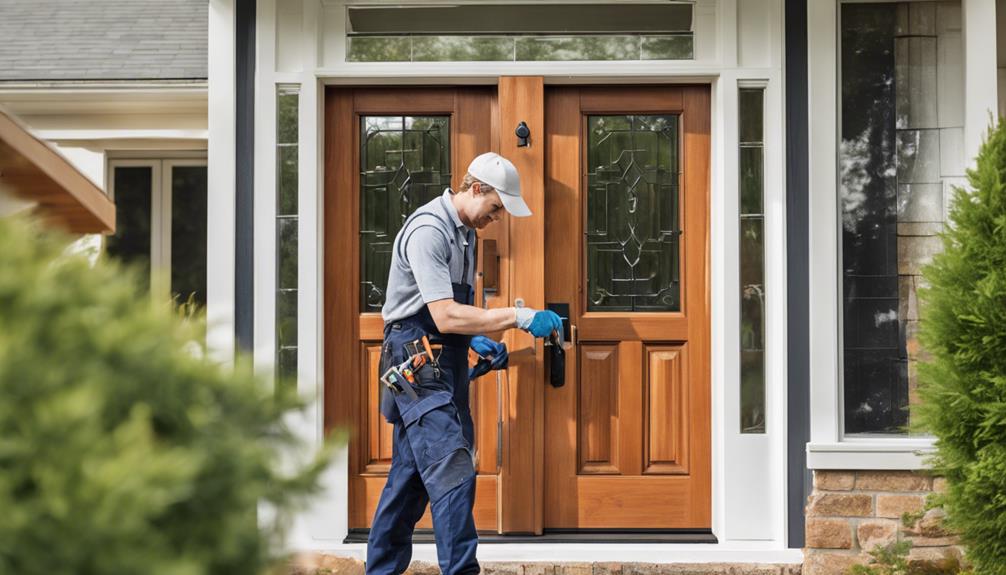
Engaging professional installers is essential for ensuring your door is properly aligned and functions at its best, minimizing the risk of break-ins. Common mistakes in DIY installations, such as improper measurements and misaligned hinges, can compromise your door’s security and efficiency. With expert installation, you safeguard not only the integrity of your door but also the peace of mind that your first line of defense is robust and dependable.
Ensuring Proper Fit and Functionality
Properly installing a door is paramount to guaranteeing it functions correctly, providing both security and energy efficiency. Professional installers guarantee precise alignment and smooth operation, critical for eliminating gaps that can lead to drafts and security breaches. I recall a client who attempted a DIY installation, only to face persistent issues with door alignment and locking mechanisms. A professional intervention rectified these problems, underscoring the importance of expertise. Investing in professional installation ensures that potential complications are addressed, providing a secure and efficient entryway. This attention to detail minimizes future maintenance concerns and fortifies your home’s defense, delivering peace of mind and long-term reliability. Proper fit and functionality are non-negotiable for maximum security.
Common Mistakes in DIY Door Installation
Many homeowners make common, yet pivotal, mistakes when attempting DIY door installations, highlighting the essential need for professional expertise. Misalignment is a frequent issue, creating gaps that compromise security and efficiency. I recall a client who struggled with a DIY installation, only to find the lock misaligned and easily tampered with. Professional installers mitigate these risks by ensuring precise alignment and correct positioning of locks and hinges, thereby enhancing security. Additionally, DIY errors can void warranties on doors and hardware, leading to unforeseen expenses. Professionals not only preserve these warranties but also guarantee that your door serves its critical role as the first line of defense for your home efficiently.
Additional Security Measures
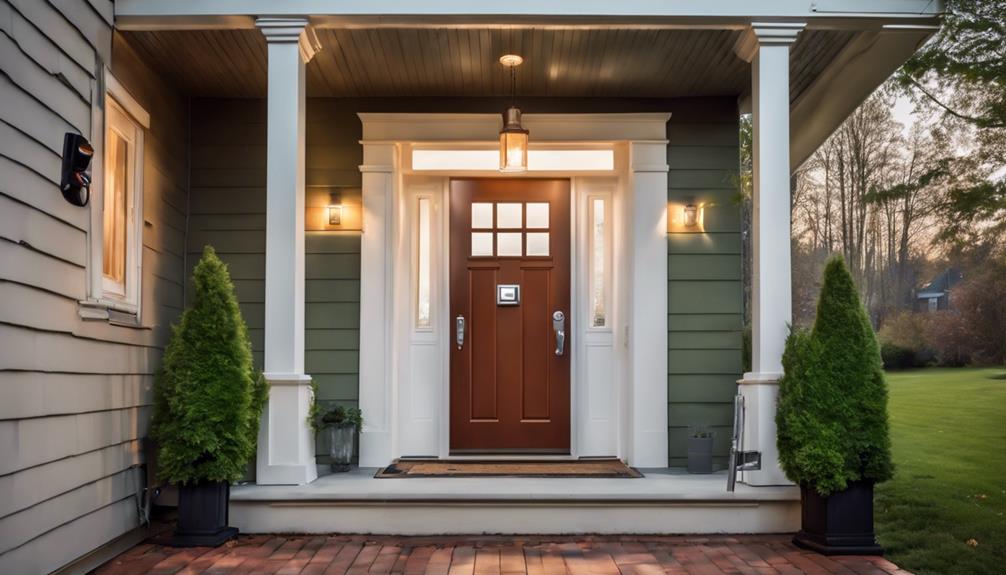
In addition, integrating additional measures such as peepholes and security cameras can provide invaluable real-time surveillance to further bolster the security of your doors. Door chains and nightlatches offer an extra layer of defense, allowing you to control access while still maintaining security. Additionally, installing weatherstripping and door seals not only enhances insulation but also fortifies your entry points against potential breaches.
Installing Peepholes and Security Cameras
Enhancing the security of your home begins with the strategic installation of peepholes and security cameras, which serve as essential tools for discreetly monitoring and verifying visitors. Peepholes, both inexpensive and easy to install, offer a clear view of who is outside your door, allowing you to assess potential threats without compromising safety. Security cameras, particularly those equipped with motion detection, provide real-time monitoring and can alert you to any suspicious activity near entry points. As someone who values control, I’ve found that integrating these measures not only deters potential intruders but also offers peace of mind. By investing in these straightforward yet effective security enhancements, you greatly strengthen the first line of defense for your home.
The Role of Door Chains and Nightlatches
Incorporating door chains and nightlatches into your home security system provides an essential layer of protection, combining practicality with peace of mind. Door chains allow you to open the door slightly while maintaining a barrier against potential intruders, a feature that is both simple to install and visually deterring. Nightlatches, on the other hand, offer the convenience of an automatic lock mechanism that secures your door upon closing. This dual approach not only enhances security but also grants homeowners a sense of control over their entry points. Personally, after installing a nightlatch, I appreciated the immediate peace of mind knowing my door was securely locked without additional effort. These measures collectively fortify your home’s defenses effectively.
Weatherstripping and Door Seals for Added Security and Insulation
In addition to enhancing the energy efficiency of your home, weatherstripping and door seals also serve as critical components in bolstering door security by reinforcing the door’s structural integrity. By preventing drafts, these measures reduce heating and cooling costs, making your home more comfortable year-round. Properly sealed doors also ward off water infiltration, minimizing the risk of water damage and mold growth. Apart from energy efficiency, sealing doors act as barriers against dust, pollen, and insects, fostering a healthier indoor environment. Moreover, enhanced weatherstripping is a cost-effective security measure. It strengthens the door, making forced entry more difficult. Installing these seals is a straightforward yet impactful step toward achieving a secure and energy-efficient home.
Choosing the Right Lock for Your Door
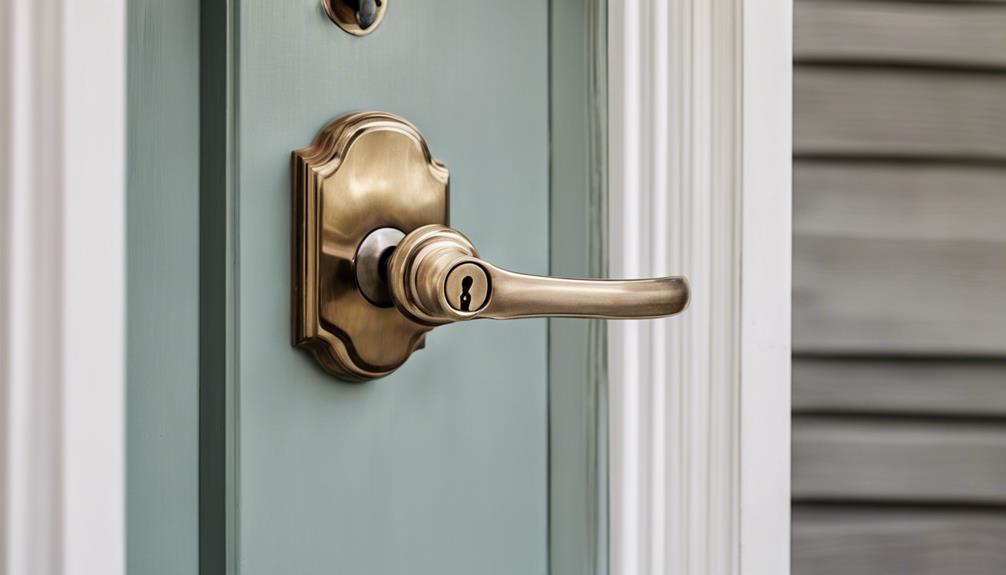
When it comes to choosing the right lock for your door, understanding the comparative advantages of traditional locks versus smart locks is essential. High-quality deadbolts, known for their robustness and reliability, often stand in contrast to smart locks, which offer the convenience of keyless entry and remote access but require careful consideration for security. Additionally, biometric and keypad locks provide advanced security options, balancing ease of use with sophisticated technology to enhance your home’s protection.
Comparing Traditional Locks with Smart Locks
Choosing the right lock for your door involves weighing the tangible security benefits and technological advancements offered by traditional locks and smart locks. Traditional locks, using physical keys, are straightforward but can be cumbersome if keys are lost, necessitating rekeying. Smart locks, however, provide keyless entry via smartphones or codes, offering unmatched convenience. These locks allow remote access control, enabling you to monitor and manage entry from anywhere. Additionally, smart locks can log entry and exit times, enhancing security monitoring. Personally, I’ve found the ability to schedule access for guests invaluable, eliminating the need for spare keys. Ultimately, the choice depends on your preference for physical security or the advanced, flexible control that smart locks provide.
The Benefits of Biometric and Keypad Locks
Expanding on the conversation about traditional and smart locks, it’s important to explore the advanced security features provided by biometric and keypad locks. Biometric locks utilize unique physiological characteristics, such as fingerprints, ensuring that only authorized individuals gain access, thereby eliminating the risk of lost or stolen keys. Keypad locks, meanwhile, offer unparalleled convenience through easily changeable access codes. They can also be programmed with multiple user codes, allowing different individuals controlled access. From a personal experience, implementing a biometric lock in my home has greatly heightened security, providing peace of mind. For those seeking to enhance their home’s security, both biometric and keypad locks present technologically advanced solutions tailored to modern needs and a desire for control.
Maintaining Your Door for Longevity and Security
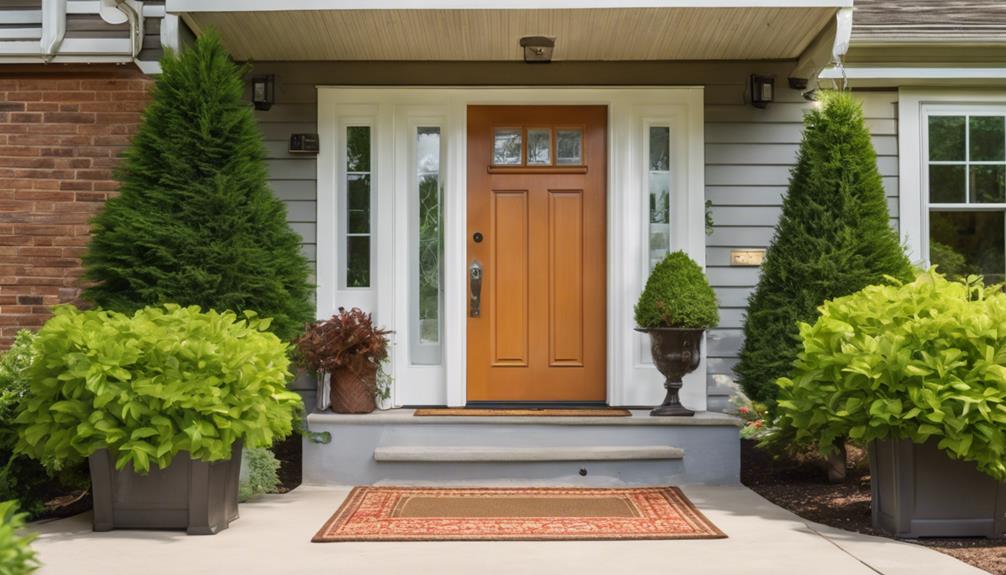
Ensuring the longevity and security of your door begins with regular inspections, focusing on identifying and addressing any signs of wear and tear. Routine maintenance, such as lubricating hinges, tightening screws, and inspecting locks, is essential for maintaining peak functionality and preventing issues like sticking or squeaking. By adhering to these maintenance tips, you can effectively mitigate security vulnerabilities and extend the lifespan of your door, solidifying its role as your home’s first line of defense.
Regular Inspections and Maintenance Tips
Regular inspections and maintenance are paramount to extending the lifespan of your doors and maintaining peak security for your home. Frequent checks for loose hinges, damaged frames, or malfunctioning locks are essential. Lubricate hinges and locks to prevent rust and maintain smooth operation. Personally, I’ve found that bi-annual lubrication greatly reduces wear. Replacing weather-stripping not only enhances energy efficiency but also keeps out drafts and moisture, preserving the door’s integrity. By adhering to these practices, you improve your door’s functionality and bolster your home’s security. Regular attention to these details ensures that your doors remain a reliable barrier against potential intrusions.
Recognizing and Addressing Wear and Tear
Often, identifying and dealing with wear and tear on your doors is crucial for preserving both their longevity and the overall security of your home. Regular maintenance, such as weather-stripping and sealing cracks, can shield your door from the elements, maintaining its integrity. Prompt inspection and repair of any damage can prevent further deterioration and mitigate potential security risks. For instance, lubricating hinges and locks on a routine basis guarantees smooth operation and prevents sticking. From my experience, a well-maintained door not only enhances security but also offers peace of mind. By taking control with proactive care, your door remains an effective barrier, safeguarding your home for years to come.
Emergency Lockout Solutions
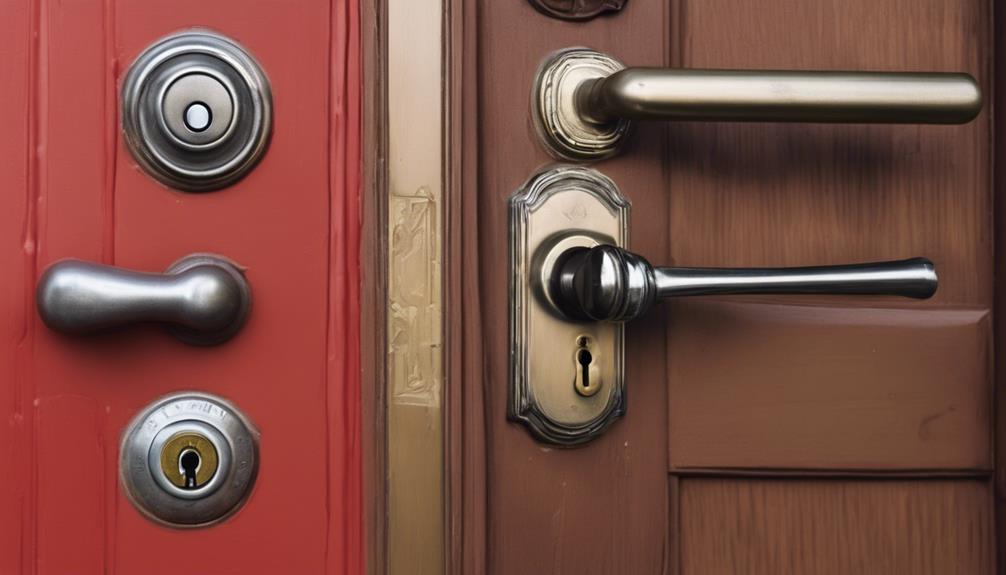
When you’re unexpectedly locked out of your home, knowing the immediate steps to take can greatly reduce stress. Engaging a professional locksmith who offers 24/7 emergency services guarantees that you can address lockouts caused by lost keys, broken locks, or forgotten combinations efficiently. These experts employ techniques such as lock picking, key cutting, and lock replacement to restore access with minimal disruption.
What to Do When You’re Locked Out
In the event of a lockout, it is important to evaluate your options systematically to regain access efficiently and safely. First, remain calm to assess the situation. Check if a spare key is available from a trusted neighbor or family member. DIY methods like using a credit card or hairpin might open simple mechanisms, but should be attempted with caution to avoid damage. Personal experience has shown that such methods can sometimes work but are not foolproof. Consider installing a keyless entry system to prevent future incidents. Acting methodically guarantees you maintain control and resolve the situation effectively. In cases where these methods fail, professional assistance may be necessary.
The Role of a 24/7 Emergency Locksmith Service
Should DIY methods and spare keys prove ineffective, enlisting the expertise of a 24/7 emergency locksmith service offers a reliable and professional solution to regain access to your home. These trained professionals are adept at handling various locks and security systems, ensuring quick and efficient service. Utilizing specialized tools and techniques, they can resolve lockout situations without causing damage to your property. The round-the-clock availability of emergency locksmiths provides peace of mind, knowing that assistance is just a call away, regardless of the time. My own experience with a midnight lockout highlighted the importance of swift and secure re-entry, reinforcing the value of a dependable, professional locksmith service at any hour.
Conclusion
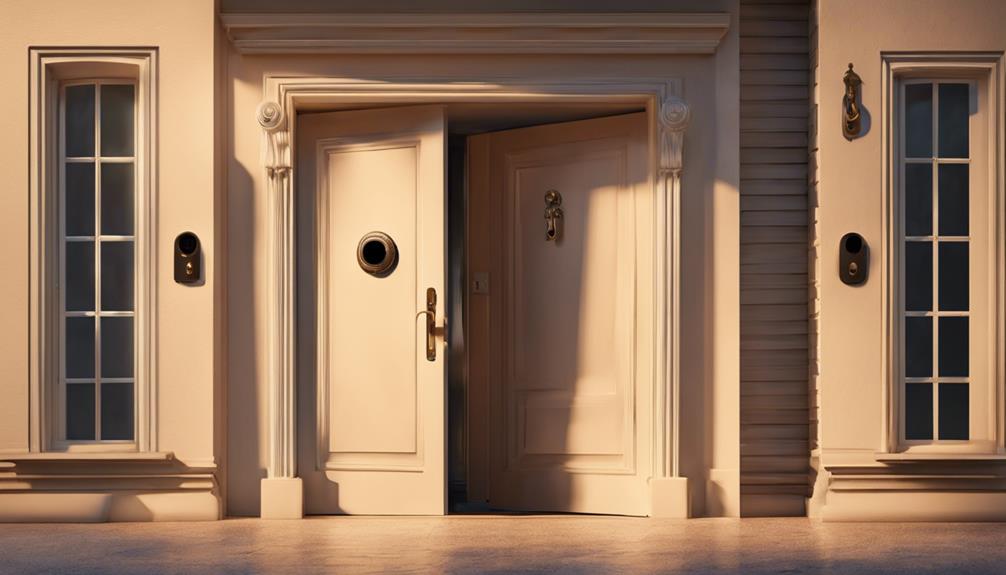
In summarizing the importance of door security, it is imperative to recognize that investing in high-quality doors and locks is a critical step in safeguarding your home. From technical advancements in lock designs to personal experiences of heightened peace of mind, the benefits of a well-secured entryway are undeniable. By prioritizing robust door security measures, homeowners can greatly deter potential intruders and protect their loved ones and possessions.
Summarizing the Importance of Door Security
The paramount importance of door security lies in its role as the foremost barrier against unauthorized entry, providing homeowners with both physical protection and psychological assurance. Doors are the primary entry points for intruders, making their security essential. Enhancing door security effectively deters potential criminals, thereby reducing the risk of break-ins and unauthorized access. By addressing vulnerabilities such as weak locks or flimsy door frames, homeowners can greatly bolster their defenses. My experience as a security consultant has shown that even simple upgrades, like installing reinforced door frames and high-quality locks, can have a profound impact. Ultimately, securing your doors is not just a preventive measure but a critical investment in your home’s safety and your peace of mind.
Encouraging Homeowners to Invest in Quality Doors and Locks
Recognizing the critical role of high-quality doors and locks in safeguarding your home, it is imperative to invest in robust security solutions that offer both resilience and reliability. Quality doors and locks deter criminals, providing peace of mind. Weak locks are easily compromised, making front doors vulnerable targets for burglaries. Front doors, being the most obvious entry points, necessitate strong security measures. Reinforced doors paired with high-quality locks can greatly elevate home security. From personal experience, upgrading to a solid-core door and a deadbolt lock drastically reduced my anxiety about break-ins. Technical advancements in security hardware now offer smart locks that combine convenience with enhanced protection, ensuring your home remains a fortress against unauthorized access.
Final Thoughts

To sum up, consulting a reliable locksmith can greatly enhance your door security by recommending and installing high-quality locks and reinforcements. Regular security upgrades and assessments are essential for adapting to evolving threats and ensuring continuous protection. Personally, I’ve found that periodic evaluations of my home’s entry points have not only improved security but also provided invaluable peace of mind.
Emphasizing the Role of a Reliable Locksmith in Home Security
Engaging a reliable locksmith is a critical step in fortifying your home’s security infrastructure. With specialized knowledge and tools, locksmiths are adept at installing, repairing, and maintaining locks to guarantee peak functionality. During a recent upgrade, I consulted a reputable locksmith who expertly assessed my door security, recommending high-security locks tailored to my home’s specific needs. This personalized guidance is invaluable, as it empowers homeowners to make informed decisions. Additionally, in emergencies like lockouts or break-ins, a trusted locksmith provides swift and efficient solutions, reinstating security promptly. By making sure that locks are properly installed and maintained, a reliable locksmith greatly enhances the first line of defense for your home, offering peace of mind and control.
Encouraging Regular Security Upgrades and Assessments
Conducting regular security upgrades and assessments is essential for maintaining the effectiveness of your home’s first line of defense. Identifying vulnerabilities in your door security system allows you to stay ahead of potential threats. For instance, upgrading to reinforced deadbolts or adding smart locks can greatly deter burglars. During an assessment of my own home, I discovered outdated hardware, which, once replaced, greatly enhanced my peace of mind. Investing in these upgrades is a proactive step that guarantees your home remains a fortress, protecting your loved ones and valuable possessions. Remember, regular evaluations are not just about fixing issues but fortifying your home’s defenses, keeping them robust and reliable against evolving security challenges.
Frequently Asked Questions
How Can I Reinforce My Door Frame for Added Security?
To strengthen your door frame for added security, consider installing metal plates and using a door frame reinforcement kit. These kits typically include strike plates and hinge reinforcements that enhance the frame’s strength. Make sure to use long screws that penetrate deep into the wall studs for maximum effectiveness. This will fortify the door frame, making it much more resistant to forced entry, thereby enhancing the overall security of your home.
What Materials Are Best for Weather-Resistant Doors?
An ounce of prevention is worth a pound of cure. When selecting materials for weather-resistant doors, fiberglass stands out due to its exceptional weather-resistant properties and durability. Steel doors also offer robust resistance to environmental factors. Solid wood, if well-maintained and properly sealed, can provide excellent weather resistance. For enhanced protection, impact-resistant fiberglass doors are ideal, combining toughness with superior weather resilience to safeguard your home.
Are Smart Locks Compatible With All Types of Doors?
Smart locks are generally compatible with most standard door types, including wood, metal, and fiberglass. They can be installed on both exterior and interior doors, as well as smart garage doors. However, compatibility depends on the specific smart lock model and the door’s existing hardware. It is important to review the specifications and compatibility requirements before purchasing to guarantee a seamless integration with your door system.
How Often Should I Replace My Door’s Weather Stripping?
Weather stripping should be replaced every 3-5 years to maintain its effectiveness. Indicators of wear include air leaks, moisture seepage, and increased energy bills. Regular inspection is vital for early identification of issues. Upgrading weather stripping not only enhances energy efficiency and home comfort but also prolongs the lifespan of doors and windows. Timely replacement guarantees peak performance, contributing to a more controlled and stable indoor environment.
Can I Install a Peephole on Any Type of Door?
Yes, a peephole can typically be installed on most door types, including wood, metal, and fiberglass. The installation process, however, may vary depending on the door material. It’s important to confirm the door is suitable for drilling to avoid damage. Some door materials might necessitate additional tools or expertise. For best results, consult a professional or adhere to manufacturer guidelines specific to the door type being modified.
